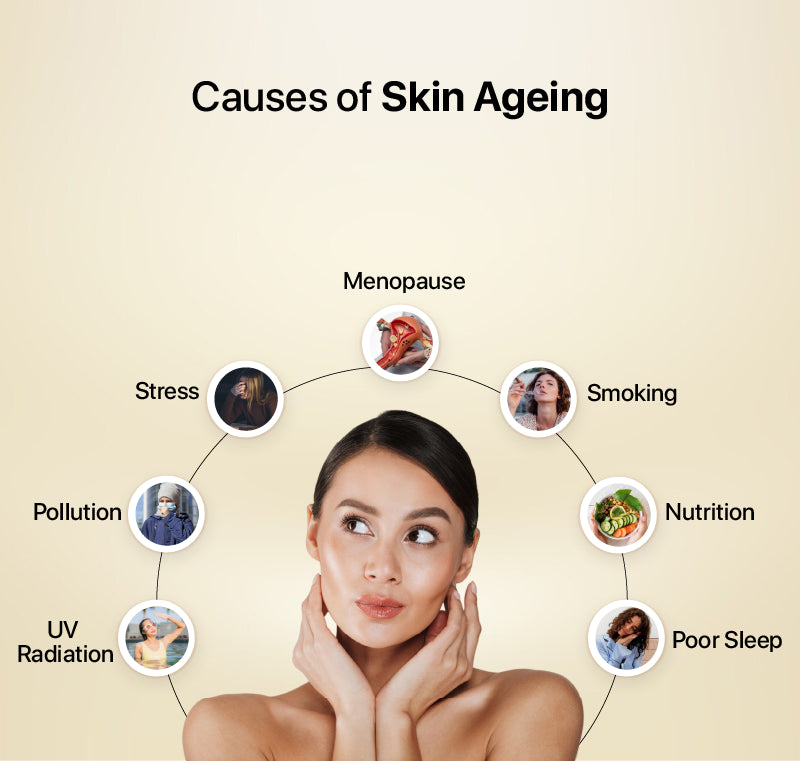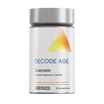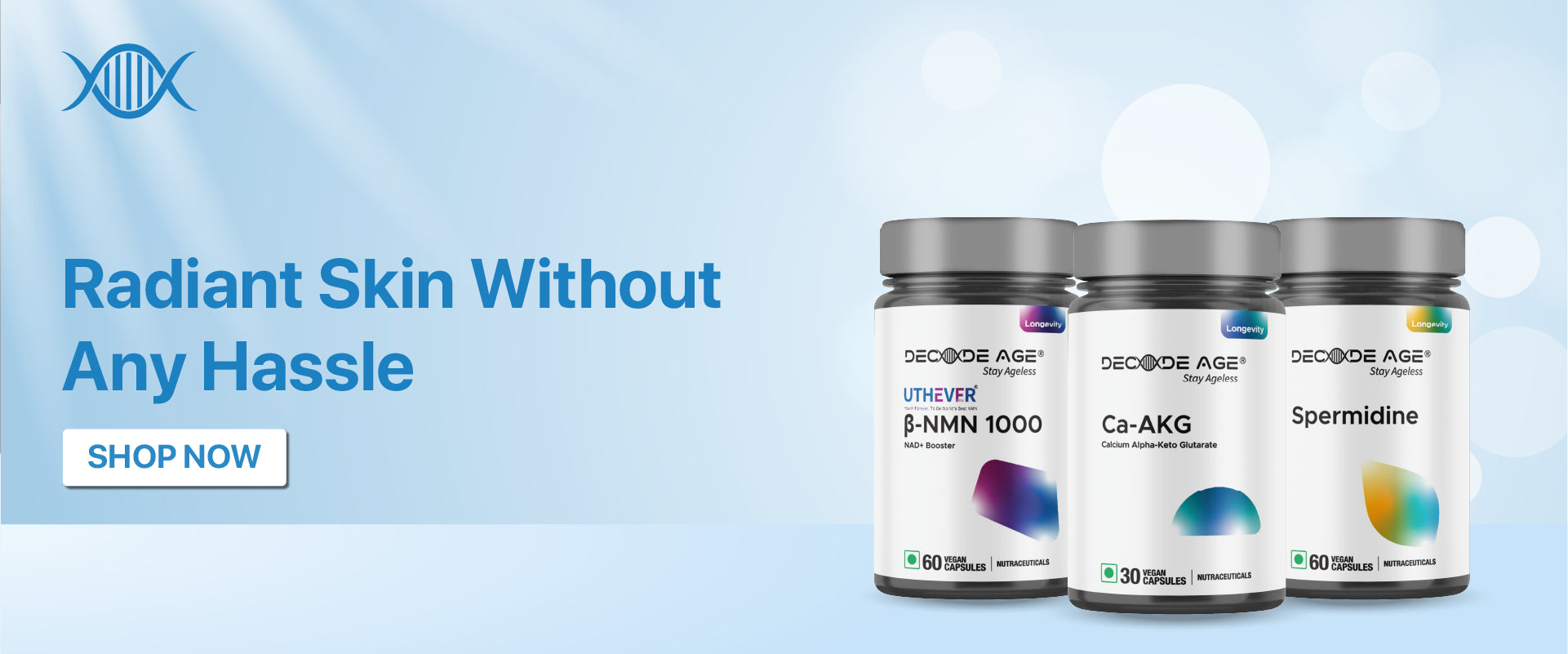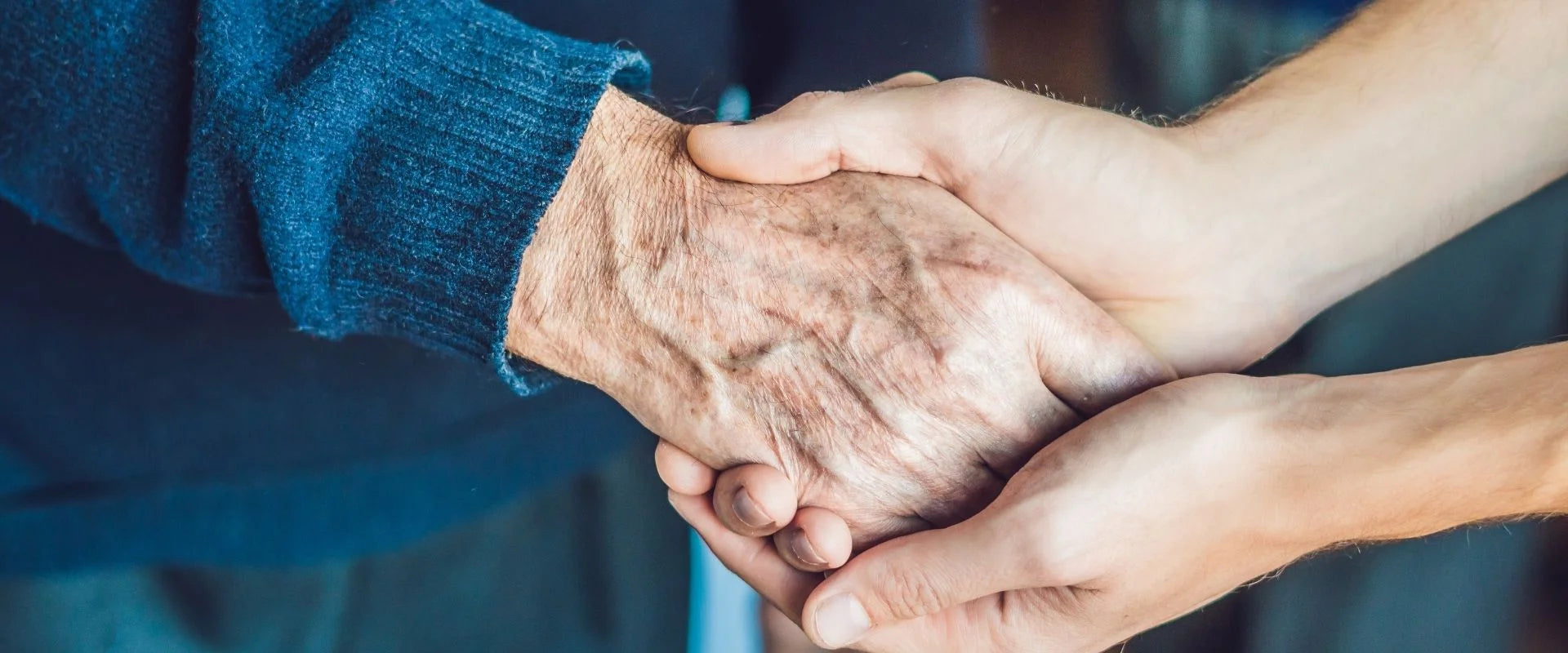Is your skin showing signs of premature ageing making you looker aged? As we age, our skin undergoes significant changes, sometimes leading to premature ageing characterised by the development of wrinkles, age spots, unevenness, and dryness.
This comprehensive information gets deeper into the intricate process of skin ageing, exploring its causes, types, preventive tips, supplements, and treatments.
Skin, like a silent storyteller, hides the damage inflicted by intrinsic and extrinsic factors over time. Understanding these complexities is crucial in maintaining skin health and combating the signs of ageing. Discover the best slow ageing supplements that can help unveil a glowy and youthful complexion, revealing the beauty that lies beneath the surface.
What is Skin Ageing
Skin ageing is a complex biological process influenced by chronological ageing, photo-ageing, hormonal deficiencies, and environmental factors. These factors collectively cause structural and physiological changes in the skin. The process involves a reduction in the number of fibroblasts that produce collagen and vessels that supply the skin, leading to increased laxity and the formation of wrinkles. Skin ageing is a result of mechanisms such as glycation, free radicals, cell cycle changes, and cellular and molecular processes.
Types of Skin Ageing
Skin ageing is broadly classified into two types: intrinsic and extrinsic ageing. Both types of ageing contribute to the overall deterioration of skin quality, leading to wrinkles, fine lines, and other signs of ageing. This distinction helps in formulating targeted strategies to address specific ageing concerns and promote overall skin health
Intrinsic Ageing of Skin
Intrinsic skin ageing is a natural, genetically determined process characterised by physiological changes that occur over time. It primarily reflects the genetic clock and metabolic processes within our bodies. This type of ageing begins in the mid-20s and is marked by a gradual decline in collagen and elastin production, leading to a loss of skin fullness and elasticity.
As we age, our skin also becomes thinner and drier, making it more prone to cracking and sagging. These changes contribute to the development of wrinkles and other signs of intrinsic ageing, particularly noticeable in photoprotected areas, such as the inner side of the upper arm.
Extrinsic Ageing of Skin
Extrinsic ageing is the result of external environmental factors which can lead to coarse wrinkles, loss of elasticity, laxity, and a rough-textured appearance in the skin. Among these factors, UV radiation is particularly impactful, accounting for approximately 80% of facial ageing by thickening the epidermis.
Environmental and lifestyle choices play a significant role in triggering premature ageing of the skin. To mitigate the effects of extrinsic ageing, preventive measures such as minimising UV exposure, avoiding smoking, and reducing exposure to pollutants are crucial. These measures can help reduce the impact of external factors on the skin and promote healthier, more youthful-looking skin.
Causes of Skin Ageing

Skin ageing is a multifaceted process influenced by various internal and external factors. Environmental factors such as pollution and UV radiation, along with lifestyle choices like smoking and poor nutrition, play significant roles in accelerating skin ageing. Here's a breakdown of the key causes:
- UV Radiation: Overexposure to UV radiation from the sun leads to premature skin ageing and increases the risk of skin cancer. UVA rays cause wrinkles and tanning, while UVB rays damage the outermost skin layer, causing spots and sunburns. Elastin fibres in the skin break down, leading to sagging and stretching, while UVC rays can cause skin burns and reduce skin elasticity.
- Pollution: Air pollution can clog pores, leading to acne, wrinkles, and age spots. Particulate matter and pollutants in smog can penetrate the skin, damaging the skin barrier and causing a dull, uneven complexion.
- Stress: Psychological stress can increase cortisol levels, leading to oxidative stress in skin cells. This imbalance between reactive oxygen species (ROS) and antioxidants can damage skin cells and accelerate skin ageing.
- Menopause: Declining estrogen levels during menopause affect collagen production, resulting in thinner skin and the development of wrinkles and fine lines.
- Smoking: Smoking triggers the production of matrix metalloproteinases (MMPs), which break down collagen, leading to sagging and wrinkled skin. The vasoconstrictive effect of smoking reduces blood and oxygen flow to the skin, contributing to premature ageing.
- Nutrition: A diet high in sugar and carbohydrates can cause oxidative stress, accelerating skin ageing. Excessive alcohol consumption and smoking also contribute to reduced collagen production and dry skin.
- Poor Sleep: Inadequate sleep reduces skin elasticity and can make you look older. Sleep is essential for the production of somatotropin, which repairs skin cells. Lack of sleep can lead to dark circles under the eyes.
These factors collectively contribute to skin ageing, highlighting the importance of lifestyle choices including age-reversing supplements, and skincare habits in maintaining youthful skin.
5 Best Skin Supplements for Healthy Ageing
Best slow ageing supplements for skin can play a crucial role in improving skin health and combating the signs of ageing. These supplements are rich in antioxidants, such as vitamins C and E, which protect skin cells from free radicals and promote collagen production. Additionally, supplements containing ingredients like collagen, and peptides can help improve skin elasticity and hydration, reducing the appearance of wrinkles and fine lines. Incorporating these supplements into your daily routine can support overall skin health and promote a more youthful complexion.
NMN
Nicotinamide mononucleotide (NMN) has shown remarkable efficacy in enhancing skin health, particularly in improving skin elasticity and reducing the appearance of wrinkles and fine lines. This suggests NMN is a potential ally in maintaining youthful skin texture and appearance. NMN, a derivative of vitamin B3, is easily absorbed into the body, increasing cellular energy production and repairing skin cells.
It also reduces inflammation, fights oxidative stress, stimulates collagen production, prevents age spots, supports healthy ageing, aids in DNA repair, helps regulate the circadian rhythm cycle, and tightens the skin. NMN has shown the ability to control the cell-deteriorating and skin-damaging effects of UV rays, making it one of the promising age-reversing supplements for improving skin health and combating ageing.
Ca-AKG
Calcium-AKG has been shown to increase collagen production and reduce skin wrinkles, indicating its potential to improve skin health. Recent studies have demonstrated that its supplementation promotes skin hydration and barrier function by activating cell proliferation and supporting epidermal function.
Additionally, AKG can reduce inflammation, which is significant as ageing is often accompanied by increased systemic inflammation, known as "inflammaging," which contributes to premature skin ageing. Ca-AKG's ability to address these skin issues makes it a promising supplement for promoting healthy skin ageing.
These findings suggest that AKG supplementation could be beneficial for improving skin health and combating the effects of ageing, making it a potential contender among these best slow ageing supplements.
Spermidine
Spermidine supplement shows promise in slowing skin ageing by supporting collagen, elastin, and lipid synthesis in aged cells. However, the benefits of oral or topical spermidine for human skin health are limited, although some animal studies indicate that spermidine when applied topically or taken orally, can reduce inflammation and improve wound healing.
Spermidine also possesses antioxidant properties, which can help protect the skin from harmful UV rays. These findings suggest that spermidine supplementation could improve skin health significantly.
Collagen
Collagen is a vital skin component responsible for its strength, elasticity, and hydration, which declines with age. Collagen supplements can help slow skin ageing by reducing wrinkles and dryness and may prevent acne and other skin conditions. Overall, collagen supplementation shows promise in improving skin health and combating signs of ageing.
Vitamin C
Vitamin C is a potent antioxidant that combats free radicals in the skin, shielding it from UV rays and pollution. It aids in reducing wrinkles, maintaining skin elasticity, fading pigmentation, and promoting radiant skin. This supplement is also available to help meet your daily intake. Incorporating this into your skincare routine can enhance skin health and protect against environmental damage.
Trans-resveratrol
We held back a surprise for your skin health regimen!
Trans-resveratrol is a powerful supplement for skin health. Its antioxidant properties protect against oxidative damage from free radicals and UV radiation, reducing AP-1 and NF-kB factors to slow down photoaging.
It inhibits melanin production, fading age spots and evening skin tone. By strengthening the skin's barrier function, it defends against external harm and reduces water loss. Additionally, it minimizes skin inflammation and redness. Incorporating trans-resveratrol into your skincare routine can enhance your skin's resilience and appearance, providing a powerful choice for maintaining healthy, youthful skin.
Healthy Habits to Boost Skin Health
In addition to using skin supplements for healthy ageing, adopting healthy habits can protect your skin from environmental damage and slow down the ageing process. Here are some key practices to incorporate into your skincare routine:
1) Protect Your Skin from the Sun
The sun emits harmful UV radiation, consisting of UVA, UVB, and UVC rays. UVA rays penetrate deep into the skin, causing wrinkles and sagging. UVB rays are carcinogenic and can lead to skin cancer. UVC rays cause severe burns and eye injuries.
Use sunscreen with a high SPF to block UV rays and opt for broad-spectrum formulas that protect against both UVA and UVB rays. Apply sunscreen regularly, especially if you're outdoors for extended periods.
2) Use Self-Tanner Instead of UV Tanning
UV tanning, whether from the sun or tanning beds, accelerates skin ageing and increases the risk of skin cancer. Instead, use self-tanning products containing dihydroxyacetone to achieve a temporary tan without damaging your skin.
3) Limit Alcohol and Smoking
Excessive alcohol consumption dehydrates the skin and reduces collagen levels, leading to wrinkles and puffiness. Smoking accelerates skin ageing, causing dullness, pigmentation, and premature wrinkles. Quit smoking and limit alcohol intake to improve your skin's health and appearance.
4) Consume a Nutritious Diet
A well-balanced diet rich in antioxidants, vitamins C and E, and hydration is essential for healthy skin. Antioxidants protect skin cells from free radicals, while hydration maintains skin moisture. Include fruits, vegetables, proteins, and healthy fats in your diet to promote youthful skin.
5) Exercise Regularly
Exercise improves blood circulation, delivering more oxygen to skin cells and promoting collagen production. This helps prevent sagging skin and maintains skin elasticity. Sweating during exercise also helps remove toxins from the body, promoting clearer, healthier skin.
6) Use Skincare Tailored to Your Skin Type
Cleansing is essential to remove makeup and impurities. Use a gentle cleanser suitable for your skin type to maintain the skin's natural barrier. For oily skin, use products with glycolic acid. Dry skin benefits from oil cleansers, while combination skin benefits from non-foaming cleansers.
Moisturize daily to prevent extreme dryness or oiliness, and apply sunscreen whenever you're exposed to the sun to protect your skin from UV damage.
Incorporating these healthy habits into your daily routine can help improve skin ageing, protect your skin from environmental damage, and promote overall skin health.
Conclusion
Are you a step away from maintaining optimal skin health? It involves understanding the types of skin ageing, and its causes, and implementing lifestyle changes. Factors like UV radiation, stress, and poor nutrition contribute to premature skin ageing.
However, incorporating skin supplements like NMN, calcium-AKG, spermidine, collagen, and vitamin C can promote skin health by supporting collagen production, reducing inflammation, and protecting against oxidative stress. These supplements along with a balanced diet rich in antioxidants and regular sunscreen use can help combat skin ageing.
FAQs
Is spermidine good for the skin?
Absolutely! Spermidine supports the skin by enhancing collagen and lipid production, aiding in skin structure and barrier function recovery, and promoting a healthier, more youthful complexion.
What are the two types of skin ageing?
There are two main types of skin ageing: intrinsic and extrinsic. Intrinsic ageing is natural and genetic, reflecting the body's internal processes over time. Extrinsic ageing, on the other hand, is caused by external factors like UV radiation and environmental pollutants, leading to wrinkles, loss of elasticity, and other signs of premature ageing.
What supplements are good for glowing skin and anti-ageing?
Skin supplements like NMN, calcium-AKG, spermidine, trans-resveratrol, collagen, and vitamin C can promote glowing skin and anti-ageing effects by supporting collagen production, reducing inflammation, and protecting against oxidative stress.

























Leave a comment
All comments are moderated before being published.
This site is protected by hCaptcha and the hCaptcha Privacy Policy and Terms of Service apply.